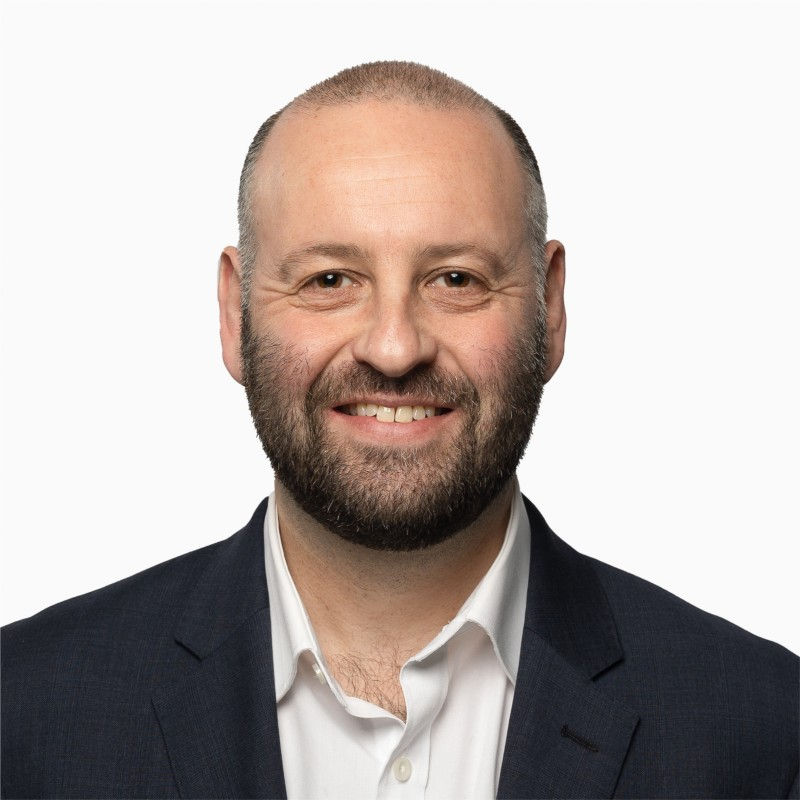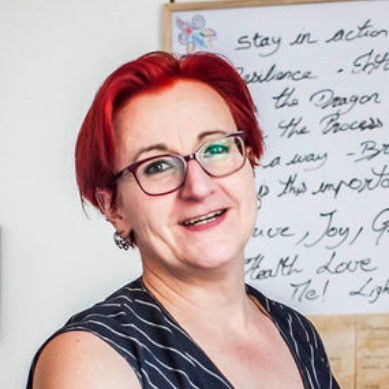From School Dropout to COO: The Brutal Truth About Layoffs, Tribunals, and Why Most Companies Get Employee Support Dead Wrong
- Guest Author
- Jul 3, 2025
- 7 min read
How Ayrtam "Erty" Ryall went from being expelled from school to leading workplace transformations at Salusphere Global – and the hard-earned insights that could revolutionise your approach to career transitions and employee wellbeing.
In this comprehensive interview, Roy Perlson, Founder & CEO of Jobago.ai, speaks with Ayrtam "Erty" Ryall, Chief Operating Officer at Salusphere Global and seasoned expert in health, safety, compliance, and workplace wellbeing, about career transitions, handling layoffs, and the importance of employee support during challenging times.
Building a Successful Career Without Traditional Education
Q: Can you succeed in your career without a university degree? What was your path to becoming a COO?
Erty: Absolutely. I never went to university – I actually got expelled from school and sixth form due to a lack of interest in academia. But that didn't stop me from building a successful career that led me to become Chief Operating Officer at Salusphere Global since September 2024. I started as a trainee legal executive, then moved into sales as a self-employed insurance salesperson, which taught me the fundamentals of the numbers game and cold calling.
From there, I spent 18 years at British Gas in various roles, including field sales and senior management in overseas business development. Later, I completed a Diploma in Management Studies from West Herts College, which provided valuable business foundations. My journey through various leadership roles, including Managing Director at Green Cross Global from 2014 to 2024, proves that success comes from adaptability, continuous learning, and being willing to seize opportunities rather than just formal qualifications.
Q: How did your experience in health and safety shape your leadership approach?
Erty: My decade as Managing Director at Green Cross Global, where we trained in over 1,500 locations annually and serviced blue-chip companies and local authorities, taught me that health and safety isn't just compliance – it's a business driver. At Salusphere Global, we focus on transforming compliance, safety, and wellbeing from mere checkboxes into catalysts for business growth. This experience shaped my positive, proactive, and dynamic approach to leadership, combining commercial acumen with genuine care for people's wellbeing.
Q: What advice would you give to professionals considering non-traditional career paths?
Erty: Building a network and being open to new experiences can significantly aid in professional growth and career progression. Don't be afraid to take risks or pivot when opportunities arise. My transitions were often driven by a desire for growth and new challenges – from British Gas to video production at Which Venture Ltd, then into health and safety leadership. The key is maintaining flexibility and viewing each experience as a stepping stone to something bigger.
Navigating Layoffs and Redundancy: Real-World Experiences
Q: How should professionals handle unexpected layoffs? What was your experience?
Erty: I've experienced layoffs from multiple angles – being laid off myself and managing them as a leader in health and safety organizations. When I was laid off from Dixons due to a health and safety violation, ironically, it was this experience that later influenced my passion for workplace safety and compliance. The emotional impact was significant – the abruptness and shock forced me to reassess my career path but ultimately led me to pursue opportunities in health and safety, where I could help prevent such incidents.
Q: What's the difference between layoffs due to financial necessity versus other reasons?
Erty: There's a crucial distinction here, especially from a workplace wellbeing perspective. When I faced redundancy at British Gas due to departmental restructuring – they were transitioning from gas showrooms to energy centres – I chose to take redundancy rather than relocate to Derby. But I've also seen layoffs driven purely by shareholder interests rather than financial necessity. In these cases, there's a moral obligation to support employees more comprehensively, especially when the redundancy isn't the employee's fault. This aligns with my advocacy for mental health and wellbeing in the workplace.
Q: How can health and safety considerations impact redundancy processes?
Erty: As someone who's spent decades in health, safety, and compliance, I've seen how poorly managed redundancies can create significant workplace wellbeing risks. Stress, anxiety, and mental health impacts are real safety concerns. At Salusphere Global, we emphasize that proactive leadership in health and safety protects people and drives business success – this extends to how companies handle workforce transitions.
Learning from Employment Tribunal Cases
Q: What should employers know about preventing employment disputes, especially regarding health and safety?
Erty: I went through a year-long tribunal case that was emotionally and financially taxing. The case arose from a workplace dispute with an employee who claimed poor onboarding and later accused the company of racial discrimination. Though we ultimately won, proving the claims were unfounded, the costs were significant. From a health and safety perspective, this taught me that comprehensive onboarding isn't just about compliance – it's about creating inclusive, safe environments from day one.
Q: What are the key lessons for HR professionals regarding tribunal cases and workplace safety?
Erty: The importance of robust HR practices, clear communication, and comprehensive safety protocols cannot be overstated. Companies should ensure their processes are equitable, transparent, and focused on genuine workplace wellbeing. As I often share on LinkedIn, health and safety should be a priority, not an optional extra. This includes mental health, inclusion, and creating psychologically safe environments where employees feel supported.
The Role of Outplacement Services in Modern HR
Q: How do outplacement services intersect with workplace wellbeing?
Erty: This is where my expertise in health, safety, and compliance meets modern HR challenges. At Salusphere Global, we understand that employee transitions are critical wellbeing moments. Traditional outplacement often misses the health and safety implications of poorly managed redundancies. There's a significant gap in individual-level outplacement services that consider the full spectrum of employee wellbeing – physical, mental, and emotional safety during transitions.
Q: What's the moral obligation of employers during redundancies from a safety perspective?
Erty: I believe there's a moral obligation to support employees during redundancies, especially when driven by shareholder demands rather than financial necessity. From a health and safety standpoint, companies have a duty of care that extends beyond the final day of employment. Poor redundancy processes can lead to stress-related health issues, mental health challenges, and even workplace incidents. This is why I advocate for practical, budget-friendly strategies that SMEs can implement to boost success and employee engagement.
Q: What opportunities exist in combining outplacement with health and safety expertise?
Erty: There's a significant opportunity to integrate comprehensive wellbeing support into outplacement services. At Salusphere Global, we offer on-demand expertise that reduces the financial burden of maintaining full-time roles in compliance and safety areas. This model could extend to outplacement – providing specialized support that addresses both career transition and wellbeing needs through consultancy, training, and software solutions.
Modern Workplace Wellbeing and Leadership
Q: How has your approach to workplace wellbeing evolved over your career?
Erty: My journey from sales and marketing at British Gas to leading health and safety organizations has taught me that wellbeing isn't separate from business success – it drives it. At Green Cross Global, we focused on cost-effective, high-quality solutions because we understood that small and medium enterprises need practical approaches. Now at Salusphere Global, we're taking this further by offering comprehensive services including First Aid, Fire Safety, IOSH, Mental Health training, and Risk Assessment that cater to major UK clients while remaining accessible to smaller businesses.
Q: What role does neurodiversity and inclusion play in modern HR practices?
Erty: As I frequently discuss on LinkedIn, neurodiversity and inclusion are fundamental to creating safer, healthier, and more productive workplaces. Companies that embrace diverse thinking styles and create inclusive environments see better safety outcomes, reduced incidents, and improved employee engagement. This isn't just the right thing to do – it's a business imperative that drives innovation and success.
HR Best Practices and Strategic Recommendations
Q: What are the most important HR best practices you've learned from your health and safety expertise?
Erty: First, implement robust onboarding processes that prioritize safety and inclusion from day one. Maintain thorough documentation not just for legal protection, but for continuous improvement of workplace practices. Second, integrate mental health and wellbeing into all HR processes – recruitment, development, and especially transitions. Finally, foster a culture where health and safety leadership is proactive, not reactive.
Q: How should companies balance cost considerations with employee support and safety?
Erty: This is exactly what we address at Salusphere Global – transforming the perception that compliance and employee support are cost centres. Through our on-demand expertise model, we help businesses access specialized knowledge without the full-time overhead. The key is demonstrating that investment in employee wellbeing, proper outplacement services, and comprehensive safety programs actually reduce costs through improved retention, reduced incidents, and better business outcomes.
Q: What practical advice would you give to SMEs managing career transitions?
Erty: Start with the fundamentals – ensure your workplace is physically and psychologically safe. Implement practical, budget-friendly wellbeing strategies that don't require massive investment. When transitions are necessary, provide support that addresses both practical needs and health impacts. Use technology and partnerships to access expertise you might not afford full-time. Most importantly, remember that taking care of your people isn't just moral – it's the foundation of sustainable business success.
Future of Workplace Wellbeing and Career Support
Q: How do you see the integration of health, safety, and career support services evolving?
Erty: The future lies in holistic approaches that recognize career transitions as significant wellbeing events. Companies like Salusphere Global are pioneering integrated solutions that combine compliance management software, learning management systems, and comprehensive training with genuine care for employee wellbeing. We're moving beyond checkboxes to create environments where people thrive through all phases of their careers.
Q: What emerging trends should HR professionals watch in workplace wellbeing?
Erty: Mental health support is becoming as important as physical safety training. Technology is enabling more personalized, accessible training and support. The rise of hybrid working requires new approaches to safety and inclusion. Most importantly, businesses are recognizing that employee wellbeing directly impacts bottom-line results – this isn't HR fluff, it's business strategy.
Key Takeaways for HR Professionals
Career success isn't limited to those with traditional academic backgrounds. Erty's journey from school dropout to COO of a leading workplace wellbeing company demonstrates that adaptability, continuous learning, and genuine care for people create lasting success. His expertise in transforming compliance and safety from cost centres into business drivers offers valuable lessons for any organization.
For HR professionals, the integration of health, safety, and wellbeing considerations into all people processes – including career transitions and outplacement – represents the future of comprehensive employee support. Companies that invest in these integrated approaches will build stronger reputations, more resilient workforces, and ultimately, better business outcomes.
The evolution from seeing workplace safety as mere compliance to recognizing it as a catalyst for business growth mirrors the broader transformation needed in how we support employees through career transitions. It's not enough to provide basic outplacement services – we need holistic support that addresses the complete spectrum of human needs during times of change.
------------------------------------------------------------------------
Ayrtam "Erty" Ryall brings decades of experience in health, safety, compliance, and workplace wellbeing to his role as Chief Operating Officer at Salusphere Global. His insights bridge the gap between traditional HR practices and modern workplace wellbeing requirements. For more resources on career transitions, employee support services, and workplace wellbeing solutions, explore both Jobago.ai and Salusphere Global's comprehensive approaches to modern workforce challenges.




Comments